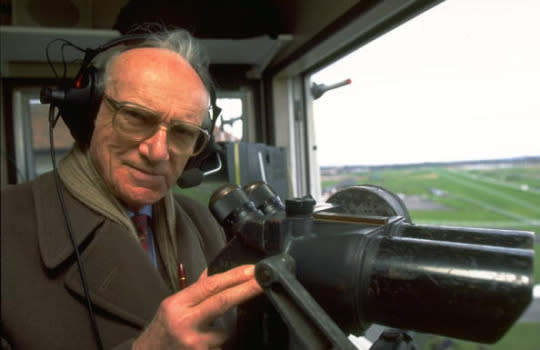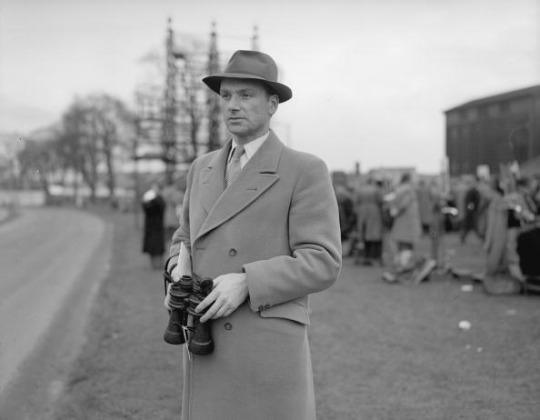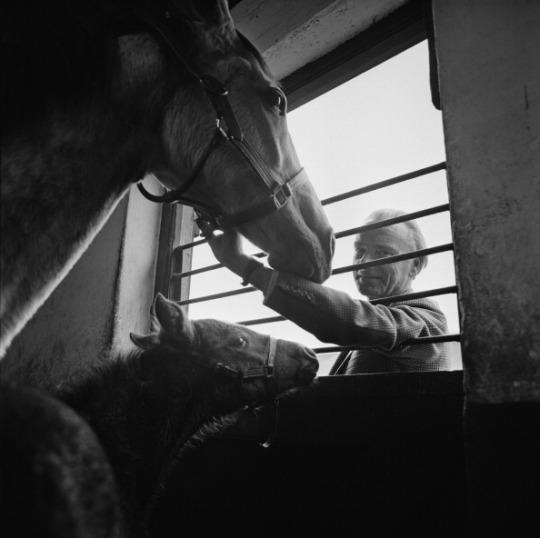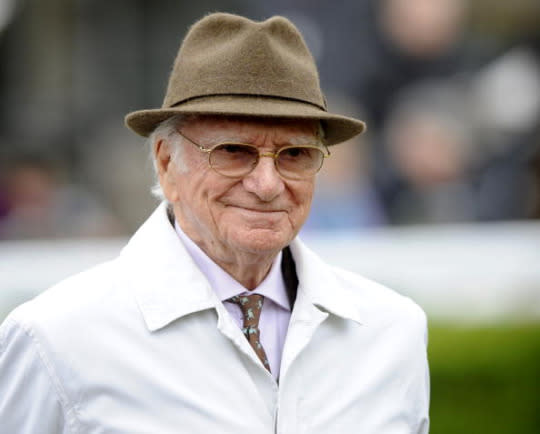yahoonick
In our weekly series, Yahoo Sport’s Nick Metcalfe features a famous voice of sport. On a big weekend of horse racing, which includes Champions Day at Ascot, the legendary BBC commentator Sir Peter O’Sullevan is the latest to go under the spotlight.

Sir Peter O'Sullevan was a true broadcasting giant, having guided us magnificently through the highs and lows of horse racing for half a century.
Such was his standing in racing, particularly in his later years, that he was undoubtedly one of the most famous people involved with the sport. So many special moments, horses and races went hand in hand with a typically brilliant O'Sullevan commentary.
His love of racing was lifelong. When O’Sullevan was just seven, he was taken to Epsom, home of the Derby. He rode his pony round the famous Tattenham Corner and up the straight to the winning post. He was instantly hooked.
A keen gambler throughout his long life, O’Sullevan is believed to have placed his first bet at the age of 12, sixpence on Tipperary Tim, a 100-1 winner of the 1928 Grand National.
Despite struggling with asthma, something that would affect O'Sullevan his whole life, he began to take an interest in journalism. He took a correspondence course, and sent articles on a number of subjects to magazines.

His first big break was taking over a friend’s job as racing correspondent of the Reading Gazette. And towards the end of World War Two, O'Sullevan was given a job with the Press Association. As with nearly all the wonderful broadcasters I’ve featured in this series, O'Sullevan started in the written press.
At the same time as working with PA, O'Sullevan also made advances in the broadcasting business. He worked occasionally for the BBC’s Overseas Service, and acted as a racereader for top commentators of the time like Raymond Glendenning and Peter Dimmock. He started commentating for BBC Radio, and in early 1948 he called three races for BBC TV at Kempton Park.
O'Sullevan also began working for The Express, in the days when it was a noble newspaper. He quickly gained a reputation for being a superb tipster - he gave the winners of four of the five classics in 1950. He carried on writing for the Express for decades, but it was as a broadcaster that he became most renowned across the country and beyond.
Racing was a staple diet of the BBC’s sporting output for decades. It was a regular part of the Saturday afternoon programme Grandstand, which became a ritual for millions of sports fans. And O'Sullevan was always the man in the commentary box calling the horses home. He soon became known as “the voice of racing”.

Cheltenham and Aintree in the spring, Royal Ascot and Epsom in high summer, a host of big jump races through the autumn and winter. Very different days but the same timeless companion.
Viewers trusted O'Sullevan always. They knew where they were with him. He was authoritative and straight forward. Often understated, but with a natural sense of occasion.
When something really mattered we knew about it. O'Sullevan’s voice would rise in tandem with growing excitement from the crowd. He just had the ideal rythym to be a racing commentator. He knew the sport inside and out, and every inflection in his voice reflected that deep knowledge.
Of course, there was always pinpoint accuracy. O’Sullevan knew better than anybody the vital nature of correctly identifying the runners and riders, and in that regard he was peerless.
And for me, there was another crucial aspect to O’Sullevan’s work. Nobody ever doubted his deep love and respect for racing. It shone through in his commentaries, decade after decade. He so obviously cared enormously about the sport. Viewers like that kind of thing.
The Grand National - the most famous horse race in the world - was always such an important part of O'Sullevan’s life. And in the public’s eye, it became the event most associated with him. As a commentator, he simply thrived when describing it.
So many of the editions of the Aintree saga are part of sporting folklore. There was Devon Loch mysteriously collapsing with the finish line in sight in 1956, and rank outsider Foinavon taking advantage of a chaotic pile-up at the 23rd fence to win the 1967 race.
The 1970s was mostly about Red Rum. The horse known throughout racing and beyond as “Rummy” won the National in 1974 and 1975, and was going for a remarkable hat-trick in the 1977 race. On an unforgettable April afternoon, O'Sullevan’s words would embed themselves into the collective consciousness of sports fans for generations.
“They’re coming to the elbow, there’s a furlong now between Red Rum and his third Grand National triumph. And he’s coming up to the line, to win it like a fresh horse in great style. It’s hats off and a tremendous reception. You’ve never heard one like it at Liverpool. Red Rum wins the National.”
The National has never stopped throwing up incredible stories. Bob Champion had recently recovered from testicular cancer when he lined up on board Aldaniti in the 1981 race. The horse had himself recovered from a serious leg injury. The stage was set for a classic Aintree fairytale. Cue O'Sullevan.
In 1993, repeated confusion over the start led to the National that never was, with 30 of the 39 runners eventually going off to no avail, seven of them going all the way round to complete the course. The race was declared void, and a hugely despondent O'Sullevan called it “the greatest disaster in the history of the Grand National”.
Typically, his final National behind the microphone in 1997 also threw up a major story, with a bomb scare forcing Aintree to be evacuated on the Saturday and the race eventually taking place two days later, won by Lord Gyllene.
While the National was the race that united a whole nation in watching, another jumps spectacular that everyone in the sport adores just as much - the Cheltenham Gold Cup - was also described by O'Sullevan for generations.
He was there for the iconic Arkle’s three successive wins in the 1960s. And a quarter of a century later came a Gold Cup that captured the public imagination like few others, when the much-loved grey Desert Orchid claimed a fabled victory. Naturally, there was more O’Sullevan excellence on that March day in 1989.
“He’s beginning to get up. Desert Orchid is beginning to get up as they race towards the line. There’s a tremendous cheer from the crowd and Desert Orchid is going to win it. Desert Orchid has won the Gold Cup. Yahoo is second, third is Charter Party. Simon Sherwood punches the air. Dessie has done it.”
O'Sullevan also owned a number of very fine horses. Often he commentated on races involving them. It was typical of the man that he never showed the slightest hint of involvement, and certainly no bias. When his popular Attivo won the 1974 Triumph Hurdle at the Cheltenham Festival, O'Sullevan was on the air.
After the horse crossed the line to win, he said: “And it’s first Attivo, owned by Peter O'Sullevan, trained by Cyril Mitchell and ridden by Robert Hughes.” He later said it was the most difficult race he had ever called.
There was another win for an O'Sullevan horse on his very final day commentating, at Newbury in November 1997. The main event of the day was the Hennessy Cognac Gold Cup, but O'Sullevan made headlines when his horse Sounds Fyne won the Fulke Walwyn Chase.
O’Sullevan had called around 14,000 races in his remarkable career, which took us from the period just after World War Two to virtually the turn of the century. A permanent witness if ever there was one.
After he retired, it was to nobody’s surprise that the newly knighted O'Sullevan was a regular fixture at race meetings across the country. He was also actively involved in charity work, helping to protect horses and farm animals.
In 2010, Aintree named O'Sullevan as one of the eight inaugural “Grand National Legends”. In 2012, he drove himself to Paris for the Prix de l'Arc de Triomphe at the age of 94. The truth is he was just besotted by racing, right to the last.
O'Sullevan died in 2015 at the grand old age of 97. It was the end of an era. Tony McCoy, the most celebrated jockey of modern times, called O'Sullevan “the epitome of class, the most distinguished and eloquent voice of racing”. And the renowned sports journalist Hugh McIlvanney said: “He was in a league of his own. Peter didn’t just enhance an occasion, he helped enrich lives.”
There have been other fine racing commentators, and many other proud ambassadors for the sport. But in so many ways, O'Sullevan was matchless.
He offered a very special link between racing’s lauded past and the present day. He remained such a gentleman of the sport, who always carried himself with great dignity and gravitas.
And of course, he had that memorable voice. Thankfully, we can still hear it now if we choose to. Truly, O’Sullevan was a broadcaster for the ages.


